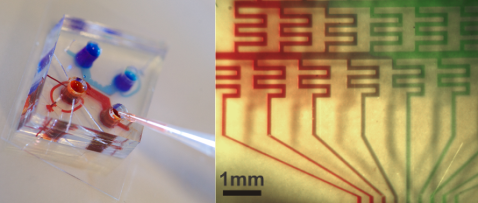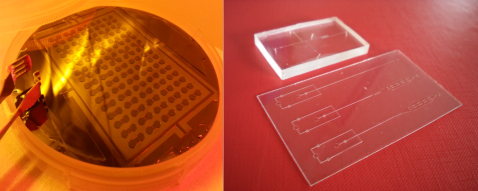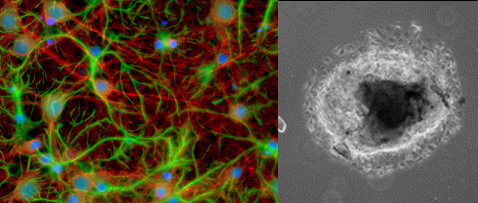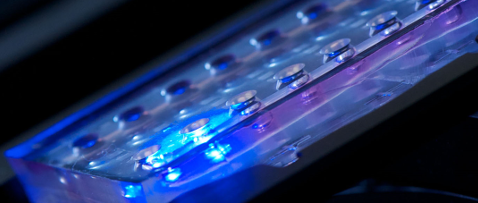
Microfluidics, Lab-on-a-Chip and Organ-on-a-Chip Technologies
Background
Microfluidic, lab-on-a-chip and organ-on-a-chip techniques enable the controlled handling of sub-microlitre volumes of fluids in an automated and high-throughput manner, offering miniaturised methods for carrying out laboratory procedures in an on-chip format. As most biological processes occur in aqueous solutions, microfluidic systems are inherently suitable to handle particles and cells suspended in fluids with micron-scale precision and in a biocompatible manner, creating in vitro mimics of biological systems.


Microfabrication
By using photo-lithography and soft-lithography, customised, biocompatible, polymeric devices for microfluidic assays can be readily prototyped in house. Such fabrication capabilities are used to produce lab-on-a-chip devices amenable to perform on-chip cell culture, cell manipulation and patterning, drug delivery and screening, artificial cell membrane formation, as well as for molecular- and synthetic-biology applications.
Microfluidics Key-benefits
REDUCED SAMPLE VOLUMES - BIOCOMPATIBILITY - HIGH-THROUGHPUT CAPABILITIES
SINGLE CELL RESOLUTION - FAST PROTOTYPING - MICROSCOPY READY
In vitro models of disease
By combining microfluidic techniques with the culture and manipulation of human primary tissue, physiologically relevant models of disease can be built for mechanistic studies and for drug testing, providing animal-free solutions to enhance the understanding of disease response to therapeutic approaches. In addition, the miniaturisation properties of microfluidic in vitro disease models enable to maximise the number of conditions tested when using limited amount of precious tissue samples derived from patients.


From lab bench to
industry
We work closely with the Biotech an Pharmaceutical industries for uptake and optimization of microfluidic techniques in R&D laboratories. In addition, we have recently created ScreenIn3D, a start-up company that provides miniaturised oncology drug screening services using 3D, human in vitro models of disease, providing innovative and scalable solutions to precision medicine.
© Copyright 2017-2025 by Michele Zagnoni